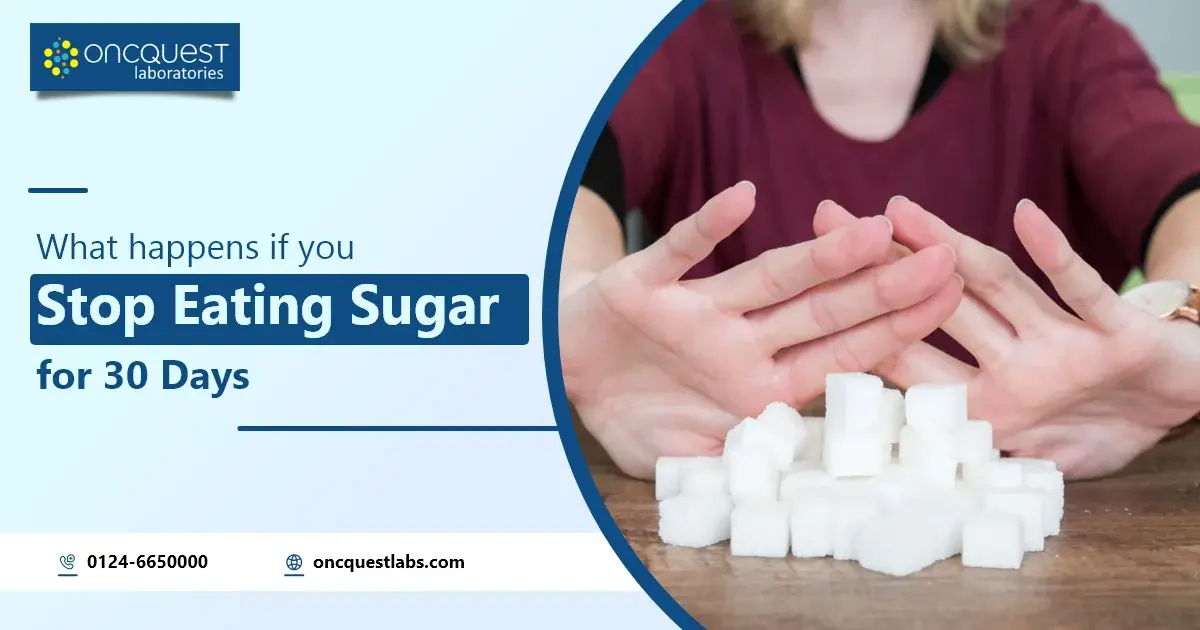Sugar is everywhere in modern diets, hidden in many foods and drinks. It’s not just in sweets, but also in items like cereals, sauces, and even bread. This widespread presence can affect health in various ways.
Cutting out sugar for 30 days can have multiple motivations. People often do it for health benefits such as better energy, clearer skin, and reduced risk of diseases like diabetes and heart disease. Others aim for weight loss, as avoiding sugar lowers calorie intake. Some take on the challenge to reset their taste buds, control cravings, or test their willpower.
This guide outlines what happens to your body and mind when you eliminate sugar for 30 days, covering initial withdrawal symptoms, the adjustment phase, and long-term benefits.
Contents
- 1 Initial Effects (First Few Days)
- 2 Week 1: Adjusting to the Change
- 3 Week 2: Notable Physical and Mental Benefits
- 4 Week 3: Long-Term Benefits Begin to Surface
- 5 Week 4: Sustainable Lifestyle Changes
- 6 Additional Tips for Success
- 7 Personal Reflection
- 8 Conclusion
- 9 FAQs
- 9.1 Why should I cut out sugar from my diet?
- 9.2 What are common withdrawal symptoms when eliminating sugar?
- 9.3 How can I manage cravings for sugary foods?
- 9.4 Will cutting out sugar improve my mood and mental clarity?
- 9.5 Can I reintroduce sugar after the 30-day challenge?
- 9.6 How can I sustain a lower sugar lifestyle beyond 30 days?
Initial Effects (First Few Days)
Withdrawal Symptoms
- Cravings for Sugary Foods: Intense desire for sweets and sugary snacks as your body adjusts to the absence of sugar.
- Possible Headaches and Fatigue: Common withdrawal symptoms include headaches and a general feeling of tiredness as your body detoxes.
- Mood Swings and Irritability: Fluctuations in mood and increased irritability due to the sudden change in diet and lack of sugar.
Immediate Physical Changes
- Changes in Energy Levels: Initial drop in energy followed by more stable energy levels as the body adjusts to the new diet.
- Potential Digestive Changes: Possible digestive issues such as bloating and irregular bowel movements as your body adapts to the reduced sugar intake.
Week 1: Adjusting to the Change
Reduction in Cravings
- Gradual Decrease in Desire for Sugary Foods: As the week progresses, the intense cravings for sugary foods begin to lessen, making it easier to stick to the diet.
Energy Levels
- Stabilization of Energy Levels: After the initial drop, energy levels start to stabilize, avoiding the highs and lows associated with sugar consumption.
- Improved Focus and Concentration: With more stable energy, mental clarity and focus improve, making daily tasks easier to manage.
Mood Improvement
- Decrease in Mood Swings: As your body adapts, mood swings become less frequent, contributing to a more balanced emotional state.
- Better Overall Emotional Stability: Enhanced emotional stability, leading to a generally better mood and improved well-being.
Week 2: Notable Physical and Mental Benefits
Weight Loss
- Reduction in Calorie Intake Leading to Potential Weight Loss: Continued avoidance of sugary foods often results in reduced overall calorie consumption, which can contribute to weight loss over time.
Improved Skin Health
- Decrease in Acne and Clearer Complexion: With less sugar in your diet, skin conditions like acne may improve, leading to a clearer and healthier complexion.
Enhanced Digestion
- Regular Bowel Movements: Improved digestive function often leads to more regular bowel movements, reducing discomfort and promoting overall gastrointestinal health.
- Less Bloating and Discomfort: Reduced intake of sugars can alleviate bloating and discomfort commonly associated with poor digestion and excess sugar consumption.
Week 3: Long-Term Benefits Begin to Surface
Stable Blood Sugar Levels
- Reduction in Blood Sugar Spikes and Crashes: With less sugar intake, your blood sugar levels become more stable throughout the day, reducing the peaks and crashes that can affect energy levels and mood.
- Decreased Risk of Developing Insulin Resistance: Lower sugar intake can contribute to improved insulin sensitivity, reducing the risk of developing insulin resistance and related health issues.
Improved Sleep
- Better Quality Sleep and More Restful Nights: As your body adjusts to a lower sugar intake, you may experience improvements in sleep quality, including falling asleep more easily and waking up feeling more rested.
Increased Physical Activity
- Enhanced Ability to Exercise: With stabilized energy levels and improved overall health, you may find it easier to engage in physical activity and exercise regularly.
- Improved Endurance and Stamina: Continued avoidance of sugary foods can lead to improved endurance and stamina during physical activities, allowing for longer and more effective workouts.
Week 4: Sustainable Lifestyle Changes
Taste Preferences
- Adjusted Palate with Less Desire for Sugary Foods: By now, your taste buds have likely adapted to lower sugar intake, reducing cravings for sugary foods.
- Increased Enjoyment of Naturally Sweet Foods like Fruits: Natural sugars from fruits become more satisfying and enjoyable, providing a healthier alternative to processed sugars.
Mental Clarity
- Enhanced Cognitive Function: With stable blood sugar levels and improved nutrition, cognitive function may be enhanced, leading to better mental clarity and sharper thinking.
- Better Focus and Memory Retention: Reduced brain fog and improved focus can contribute to better memory retention and overall mental performance.
Overall Health Improvements
- Lower Blood Pressure and Cholesterol Levels: Continued avoidance of added sugars can lead to improvements in cardiovascular health, including lower blood pressure and cholesterol levels.
- Stronger Immune System: A diet low in sugar supports a healthy immune system, reducing inflammation and providing essential nutrients for immune function.
By the end of four weeks without sugar, these sustainable changes not only benefit immediate health but also set a foundation for long-term well-being and vitality.
Additional Tips for Success
Healthy Alternatives
- Suggested Alternatives to Sugary Snacks and Drinks: Opt for snacks like fresh fruits, nuts, yogurt with no added sugars, or vegetables with hummus. For drinks, choose water, herbal teas, or infused water instead of sugary sodas or juices.
Meal Planning
- Importance of Planning Meals to Avoid Accidental Sugar Intake: Plan your meals ahead to ensure they are balanced and low in added sugars. This helps you avoid impulse eating and ensures healthier choices throughout the day.
Support Systems
- Joining Groups or Finding a Buddy for Accountability: Consider joining online communities, social media groups, or finding a friend or family member who is also cutting out sugar. Accountability partners can provide encouragement, share tips, and help you stay motivated during your sugar-free journey.
These tips can help you navigate challenges, stay on track with your goals, and make the transition to a lower-sugar lifestyle more manageable and sustainable.
Personal Reflection
Encouragement to Document Personal Experiences and Changes
- Journaling Your Journey: Keep a journal to document how you feel physically and emotionally throughout the 30 days without sugar. Note any changes in energy levels, mood, sleep patterns, and overall well-being.
- Tracking Progress: Record any physical changes such as weight loss, improvements in skin health, or digestive changes. This helps you see tangible benefits of your efforts.
Setting Future Goals Based on the 30-Day Experience
- Reflecting on Achievements: Take time to reflect on what you have accomplished during the 30-day period. Celebrate your successes and acknowledge the challenges you overcame.
- Setting Realistic Goals: Based on your experiences and the benefits you’ve observed, set realistic goals for maintaining a reduced sugar intake in the long term. Consider how you can continue to prioritize your health and well-being.
- Continuing Your Journey: Use this reflection period to plan for the future. Decide whether you want to maintain a completely sugar-free lifestyle or allow occasional treats in moderation. Set new health goals that align with your ongoing commitment to a healthier diet and lifestyle.
By documenting your journey and setting future goals, you can reinforce positive habits and continue to experience the benefits of reducing sugar intake beyond the initial 30 days.
Conclusion
Eliminating sugar for 30 days can lead to significant improvements in health and well-being, including stabilized energy levels, weight loss, clearer skin, and enhanced mental clarity. Despite initial challenges, such as withdrawal symptoms, the long-term benefits make it a worthwhile journey. Celebrate your achievements and consider how to maintain a balanced approach to sugar intake for sustained health benefits.
FAQs
Why should I cut out sugar from my diet?
Cutting out sugar can improve energy levels, aid in weight loss, enhance skin health, and reduce the risk of chronic diseases like diabetes and heart disease.
What are common withdrawal symptoms when eliminating sugar?
Common withdrawal symptoms include cravings for sugary foods, headaches, fatigue, and mood swings.
How can I manage cravings for sugary foods?
You can manage cravings by substituting sugary snacks with healthier options like fruits or nuts, staying hydrated, and planning balanced meals with protein and fiber.
Will cutting out sugar improve my mood and mental clarity?
Yes, reducing sugar intake can stabilize mood, enhance mental clarity, and improve overall cognitive function.
Can I reintroduce sugar after the 30-day challenge?
Yes, you can reintroduce sugar in moderation after the challenge, while monitoring how your body responds to maintain the benefits.
How can I sustain a lower sugar lifestyle beyond 30 days?
To sustain a lower sugar lifestyle, focus on eating whole foods, planning meals, finding support, and making mindful choices about sugar intake.





